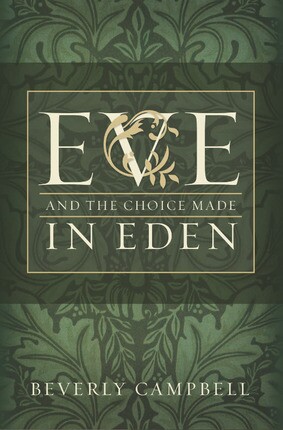Editor's note: This excerpt originally ran on LDSLiving.com in December 2022.
The Lord commanded Adam and Eve to multiply and replenish the earth while at the same time commanding them not to partake of the fruit of the tree of knowledge of good and evil. If they obeyed the second commandment, they would not fulfill the first and greater commandment. Then, as He has done in connection with no other commandment, He reminded them of their agency: “Nevertheless, thou mayest choose for thyself” (Moses 3:17).
Conflicting commandments? Ambiguity? How do we resolve this apparent contradiction?
We are taught that unless blood flowed in the veins of Adam and Eve, they would have no children. Yet, with blood flowing in their veins, they could not exist in the Garden atmosphere. This difficult ambiguity had to be worked through. With agency as the preeminent law of the universe, the choice was theirs and theirs alone. The Fall, even in light of its paramount importance to the Father’s plan, could not be forced upon Adam and Eve. They had to voluntarily choose the course themselves. Nor could their choice be made in ignorance, for a choice made in such a state would not be a true exercise of agency.
Elder Boyd K. Packer explained that “there was too much at issue to introduce man into mortality by force. That would contravene the very law essential to the plan.”1 Elder John A. Widtsoe elaborated on the agency that had to prevail in the Garden: “The eternal power of choice was respected by the Lord himself. … It really converts the command into a warning, as much as if to say, if you do this thing, you will bring upon yourself a certain punishment, but do it if you choose. …
“The Lord had warned Adam and Eve of the hard battle with earth conditions if they chose to eat of the tree of the knowledge of good and evil. He would not subject his son and daughter to hardship and the death of their bodies unless it be of their own choice. They must choose for themselves. They chose wisely, in accord with the heavenly law of love for others.”2...
President Brigham Young explained that “it was necessary that sin should enter into the world; no man could ever understand the principle of exaltation without its opposite; no one could ever receive an exaltation without being acquainted with its opposite. How did Adam and Eve sin? Did they come out in direct opposition to God and to His government? No. But they transgressed a command of the Lord, and through that transgression sin came into the world.”3
This Transgression Is Movement, Not Sin
Eve’s actions, which were followed by Adam’s, caused them to move downward, yet forward. We can best understand the word used to explain their actions, transgression, by breaking it into its parts. Trans is a Latin word meaning “to move from one state to another, on or to the other side of, beyond, over, across.” Gress is a form of a Latin word meaning “to go.”
▶You may also like: Seeing the Savior in the befores, the betweens, and the afters of Adam and Eve’s story
Alma taught that God gave commandments to men after they had transgressed (or, in other words, moved beyond, gone to the next state). This Book of Mormon prophet gave us this insight into the wonder of mortal bodies and why Adam and Eve would take the great leap into the relative unknown for all waiting spirits. Upon claiming these bodies, we become “as Gods, knowing good from evil,” and because we thereby come into possession of that great gift of agency, we place ourselves “in a state to act, or being placed in a state to act according to [our] wills and pleasures, [we can decide] whether to do evil or to do good” (Alma 12:31).
This scripture comes tripping off the tongue, and yet this profound gift is generally passed over as we seek for other pieces of the puzzle in our study of the Garden story. In mortality we fill our minds, our discussions, and our bookshelves with a search for insights into the qualities that will make us like unto God. The list becomes long and daunting and our hope of developing those qualities seems as a dream that cannot be realized. Yet He has given us the answer in these words: “Then your eyes shall be opened, and ye shall be as gods, knowing good and evil” (Genesis 3:5).
Satan wishes to blur our knowledge of the absolutes of good and evil. The power inherent in that knowledge makes us like God. It is our choice of good over evil which makes us godlike. If the adversary is able to diminish or erase our sensitivities in this regard, his chances of keeping us from becoming as God are significantly enhanced, and therefore his hope of having us within his power is exponentially advanced. We must never forget that our knowledge of good and evil also makes us free—“free to choose liberty and eternal life” (2 Nephi 2:27).
How could anyone interpret that great promise to be a punishment? A challenge, yes; a punishment—never!
Elder Russell M. Nelson hailed Adam and Eve’s course of conduct: “We and all mankind are forever blessed because of Eve’s great courage and wisdom. By partaking of the fruit first, she did what needed to be done. Adam was wise enough to do likewise.”4 ...
“I, the Lord God, Commanded”
To gain a true understanding of the principles inherent in the Lord’s seemingly contradictory instructions, we must be sure that we know both meaning and context at the time they were recorded. So much from scripture has been lost through centuries of personal interpretation, overlain with customs of changing eras.
As I began to understand the role of agency and recognized that actions taken by Eve and Adam were in accordance with law, I began to wonder if the word command used in the Creation stories was from the same root word as commandment, as in the Ten Commandments. Because I had heard a Hebrew scholar, Dr. Nehama Aschkenasy, speak on the subject of Eve and read her book on feminine images in Hebrew literature, I asked her if she was aware of any difference in the origin of those two words. She agreed to research the question for me and subsequently advised me that they in fact were not from the same origin. She found that command as used in the Creation story was from a different verb form, whose usage connotes a strong, severe warning, perhaps a statement of law, that was possibly temporary in nature, so that at some future, unspecified time it might not apply.
I thought of the warnings we give our small children who, in their tender years, must be protected in matters that involve life and death or injury. Such a warning might be, “Do not, under any condition, touch the stove.” “Do not ever cross the street alone.”
Do we mean that they are never to cross the street or to use a stove? Of course not! What we intend is that until our children have learned enough to make appropriate decisions, the stern warning, indeed prohibition, is in force. We also know, however, that as our children are prepared, they must step out into the larger world and make choices. Those choices can either be good or bad—the good will enhance and enrich their sojourn and help them fill the measure of their creation; the bad will generally bring sorrow and often diminish their opportunities for growth, be it spiritual or physical.
If God intended that there would be a time when such a “command” was not to be in effect, we can understand more clearly the account in Moses in which He advised Adam and Eve that nevertheless they might choose for themselves. This interpretation coincides with knowledge garnered from restored scripture and the words of modern prophets. This concept seems to have been known in the early Church, in the meridian of time, for in the Gospel of Philip we read: “This garden (is the place) where they will say to me, ... eat this or do not eat that, just as you wish.”5...
▶You may also like: What does it mean that Eve was created from Adam’s rib? Elder and Sister Holland and others answer
Agency, the Governing Principle
Now we return to that basic principle on which the world was founded and which governed actions in the Garden of Eden: agency. Because knowledge of this glorious gift, this concept of agency, has been lost from the Bible, it is little wonder that so few biblical scholars factor it into their thinking regarding actions taken in Eden.
We know that the war in heaven was fought over the issue of agency. Satan’s plan was to take away the agency of everyone. No one would be allowed to choose incorrectly. All would be saved, and all glory would be his. The Lord’s righteous wrath regarding this attempt to usurp control over the bodies and souls of His children is recorded in the book of Moses: “Wherefore, because that Satan rebelled against me, and sought to destroy the agency of man, which I, the Lord God, had given him, … I caused that he should be cast down” (Moses 4:3).
Agency is the governing principle in the plan of salvation. God in His wisdom and according to His promise that we may grow to become like Him does not do for us what we are capable of doing for ourselves. Nephi advised, “It is by grace that we are saved, after all we can do” (2 Nephi 25:23). If God had created Adam and Eve as mortal beings, He would have negated the very gift of agency He had given them. Thus, although the Fall was an essential ordinance, it was a step they had to perform for themselves and in proxy for all humankind.
How glorious must have been the spiritual powers of this first couple, how courageous must have been their previous actions for God to have placed this momentous decision in their hands. As spirit beings whose advancement was based on correct action, we must have ratified the plan as presented in the Grand Council of Heaven. We must have believed that Adam and Eve would advance in intellect, love, and faith to such a degree that Eve, according to her enlightened state, would be moved to partake. We also must have believed that Adam would honor this timing and according to the plan would partake as well.
Eve and the Choice Made in Eden
She writes of three levels from which the story of Eden must be viewed: as historical fact, as a series of symbols and metaphors, and as a place for beginning our own search for spiritual understanding and relevance in life. This compelling book may change forever your perception of our first parents and the choice they made.
Notes:
- Packer, “Atonement, Agency, Accountability,” 70.
- Widtsoe, Evidences and Reconciliations, 193–94; emphasis added.
- Young, Discourses of Brigham Young, 103.
- Nelson, “Constancy amid Change,” 34.
- Gospel of Philip 2.3, in Nag Hammadi Library, 153.
- Smith, unpublished address.
- Young, Discourses of Brigham Young, 103.
- McConkie, Mormon Doctrine, 268.
- Smith, Teachings of the Prophet Joseph Smith, 301.


